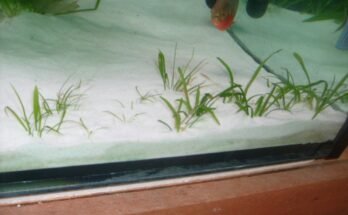Clamped fins in betta fish can be a sign of stress or illness. It’s important to address the issue promptly to ensure the betta’s health and well-being.
If you notice your betta fish exhibiting clamped fins, it’s crucial to take action to determine the underlying cause. Clamped fins can be a result of poor water quality, improper tank conditions, or even a potential health issue. By identifying and addressing the root cause, you can help your betta fish recover and thrive.
We will explore the potential reasons for clamped fins in betta fish and provide practical tips on how to address this issue effectively. With the right knowledge and proactive measures, you can support your betta fish’s overall health and happiness.
The Clamped Fins Betta
The Clamped Fins Betta is a condition that many Betta fish owners may encounter. It is essential for Betta owners to understand the signs and causes of clamped fins in order to provide proper care and treatment for their beloved fish.
Signs Of Clamped Fins
Recognizing the signs of clamped fins in a Betta fish is crucial for early intervention. Common signs include:
- Fin clamped close to the body
- Loss of fin movement
- Unusual swimming behavior
Causes Of Clamped Fins
Several factors can lead to clamped fins in Betta fish, including:
- Poor water quality
- Stress from overcrowding
- Improper water temperature
- Old age or illness
Reviving Your Beloved Fish
If you notice that your betta fish has clamped fins, it’s important to take action to revive its health. Clamped fins can be a sign of stress, illness, or poor water conditions. By creating the right environment, ensuring a proper diet and nutrition, and considering medical treatments, you can help your beloved fish regain its vitality.
Creating The Right Environment
The first step in reviving your betta fish with clamped fins is to provide it with a suitable environment. Here’s what you should consider:
- Water temperature: Maintaining a consistent water temperature between 76°F and 82°F is crucial for the well-being of your betta fish. Use a reliable aquarium heater to achieve the right temperature.
- Water quality: Keep the aquarium clean by regularly monitoring and maintaining appropriate levels of ammonia, nitrite, and nitrate. Perform partial water changes of 25% every week to ensure a healthy aquatic environment.
- Adequate space: Betta fish need enough swimming space. Ensure that your aquarium provides at least 2.5 gallons of water per fish. Additionally, add decorations and plants to create hiding spots and mimic their natural habitat.
Diet And Nutrition
The diet of your betta fish plays a significant role in its overall health. Here are some important considerations:
- Balanced nutrition: Feed your betta fish a variety of high-quality betta pellets or flakes to provide a balanced diet. Look for options that include a mix of protein, vitamins, and minerals to keep your fish nourished.
- Portion control: Avoid overfeeding your fish as it can lead to digestive issues and worsen the clamped fins. Feed your betta fish small portions, only as much as it can consume within two minutes.
- Live or frozen foods: Occasionally supplement your fish’s diet with live or frozen foods such as brine shrimp or daphnia. These foods contain essential nutrients that can enhance your betta’s health.
Medical Treatments
If the clamped fins persist despite creating the right environment and providing a proper diet, consider these medical treatments:
- Aquarium salt: Adding aquarium salt in small doses can help alleviate stress and promote healing. Follow the instructions carefully to avoid any negative effects.
- Water conditioner: Use a water conditioner that removes chlorine and chloramine from tap water before adding it to the aquarium. These chemicals can cause stress to your betta fish and contribute to clamped fins.
- Medications: Consult a veterinarian who specializes in fish health to determine if medication is necessary. They can recommend suitable medications to address any underlying illnesses or infections.
Remember, it’s important to closely monitor your betta fish’s behavior and make appropriate adjustments to its environment and diet. With patience and care, you can help your beloved fish recover from clamped fins and thrive once again.
Frequently Asked Questions Of Clamped Fins Betta
Can Betta Recover From Clamped Fins?
Yes, bettas can recover from clamped fins. Proper care, clean water, and a balanced diet can help improve their condition. Additionally, providing a stress-free environment with adequate space and hiding spots can promote healing. Regular monitoring and prompt treatment of any underlying health issues can also aid in their recovery.
How Do You Treat Clamped Fins?
To treat clamped fins, you can start by checking water parameters and adjusting them if necessary. Increase water temperature, perform regular water changes, and add aquarium salt. Treat any underlying issues such as fin rot or parasites with appropriate medications.
Provide a stress-free environment and ensure proper nutrition for your fish.
What Does Clamped Fins Mean?
Clamped fins in fish indicate the tight closure or flattening of their fins against their body due to stress or illness. It commonly occurs in aquarium fish, manifesting as a sign of discomfort or poor health.
What Is Betta Fin Clamping?
Betta fin clamping is when a betta fish’s fins are held close to its body due to stress, illness, or poor water conditions. It’s a sign of discomfort and should be addressed promptly to ensure the fish’s well-being. Regular water changes and a stress-free environment can help prevent fin clamping.
Conclusion
To conclude, addressing clamped fins in betta fish is crucial for their overall wellbeing. By understanding the potential causes and taking appropriate measures, such as maintaining proper water conditions, providing a nutrient-rich diet, and creating a stress-free environment, we can help our finned friends recover from clamped fins.
Remember, the health and happiness of our bettas rely on our dedication and care. Together, we can ensure a vibrant and thriving life for these beautiful creatures.
